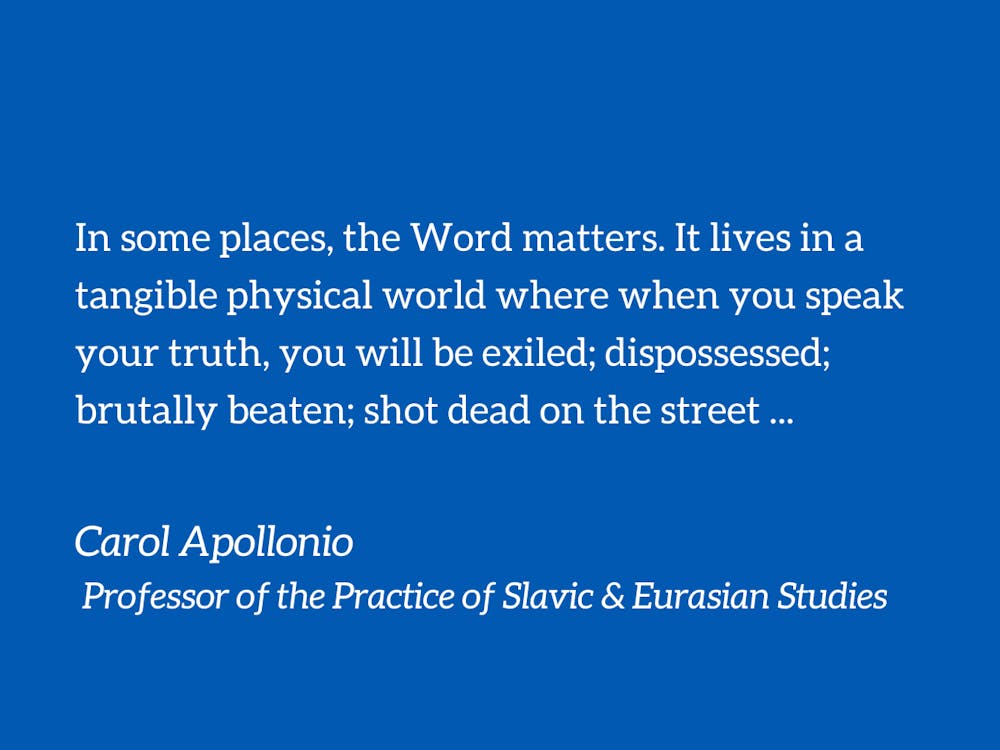In some places, when you speak your truth, nobody listens. You may write it down, but it remains readerless in your tear-blotched notebook. Say whatever you want, who cares? It’s just words.
Someone (maybe someone like me!) is forcing you to write a paper. Get your little Chat GPT tool to do it for you, blah blah blah. It’s just words. Maybe she won’t catch you and you’ll get an A! And you can take that A and get a job with it. No big deal.
Honestly, you might not get caught. Last week I did a live international event that required simultaneous, real-time interpretation into Russian. Afterwards, I looked at the YouTube recording and was impressed by the quality of the translation. When I mentioned this to my host, it turned out, the dialogue was transcribed in English, and then some AI bot-thing rendered into tolerable Russian. Which made me ponder, basically, everything I’ve ever done in my entire life.
Fine. As my fellow arms-control interpreters used to say, GIGO: "Garbage in, garbage out."
But take a breath, please.
In some places, the Word matters. It lives in a tangible physical world where when you speak your truth, you will be exiled; dispossessed; brutally beaten; shot dead on the street; poisoned by your own doorknob; imprisoned forever in the coldest place on earth; injected with mind-destroying drugs; tortured in grimy, smelly basements. You might have acid sloshed onto your face, a lethal weapons-grade nerve agent sprinkled into your underwear. Your airplane might drop out of the sky. You will be surrounded by liars, sycophants, criminals, thugs, corrupt bureaucrats and grasping, jealous, venal neighbors — all of them eager to slander, torture and annihilate you.
But as we know from Mikhail Bulgakov’s Stalinist Terror-era novel "The Master and Margarita," "Manuscripts don’t burn." Your word will live long after they destroy your body.
This stuff is real. Speaking your truth in Russia is one of the most dangerous activities known to humankind.
But it has generated the world’s most powerful tradition of the written and spoken word: a fierce body of literature that reaches deep into the soul and grips at the conscience. Avvakum was burned at the stake; Dostoevsky was arrested and exiled; Tolstoy was excommunicated; the finest thinkers, poets, writers and intellectuals of the 20th century were arrested, shot, drugged and "disappeared." In our time, a mighty wave of Russia’s best creative artists, journalists and writers have been forced from their country — those who have not been assassinated. Countless others will spend the rest of their days in prison. All they did, and do, is speak their truth.
You may be given the opportunity to cozy up with the assassins. The rewards are considerable — jobs, public acclaim, wealth, fancy cars, vacations, property, fame, TV time, maybe even the presidency of the USA (blame the Democrats). But you will live on from now until eternity as a "useful idiot" (I am a moron) and nothing more.
Once you rid yourself of the fears of the moment — that you’ll get a B+ on a quiz, that the Door Dash will be late, that you might fail my class, that your roommate will steal your wallet, that you won’t get your dream job — you will get an exhilarating little rush of freedom. Now imagine that you know that the facts you share will cause you to be separated from everyone you love, to be poisoned, tortured and killed. And you still speak out.
You will learn what true freedom is.
Speak. The world will listen.
So take a moment to understand, appreciate, and commemorate the courageous, brilliant, larger-than-life Alexey Navalny, who died on Friday, Feb. 16, 2024 in a Siberian prison. He exposed the lies and corruption of his country’s leaders, generating ever-more vicious attempts to silence him. They only made him stronger, more confident and more defiant (tell the judge the truth).
Now imagine you have just learned that your husband has died alone, far from you and his children. Instead of gathering quietly with them to mourn, you go onstage at a worldwide forum and vow to continue his struggle (what is courage?).
What else can you do, but tell the truth?
Professor Carol Apollonio has been teaching Russian literature at Duke for 40 years, and this is her final semester. Her column, "Final Rants from the Podium," typically runs on alternate Wednesdays.
Get The Chronicle straight to your inbox
Signup for our weekly newsletter. Cancel at any time.

